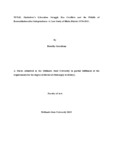Please use this identifier to cite or link to this item:
https://cris.library.msu.ac.zw//handle/11408/2754| Title: | Zimbabwe’s liberation struggle era conflicts and the pitfalls of reconciliation after independence: a case study of Bikita district 1976-2013. | Authors: | Goredema, Dorothy | Keywords: | Liberation wars Conflict resolution |
Issue Date: | 2015 | Publisher: | Midlands State University | Abstract: | This study interrogates the dynamics of conflict resolution, healing and reconciliation in Zimbabwe using Bikita as a case study. It identifies and critiques state driven approaches used by the Zimbabwean government such as blanket amnesties, deliberate amnesia and presidential pardons among others, to promote healing and reconciliation in the aftermath of the 1970s liberation war and in the post-independence electoral violence. My central argument is that state-driven approaches alone have not provide sustainable solutions to challenges facing communities emerging from violent conflict unless they are co-ordinated and harmonized with indigenous approaches. Bikita demonstrated that conflict destroys physical property as well as the social, emotional and psychological capital leaving victims insecure and traumatized. In cases such as these, state-driven approaches alone are inadequate to heal and reconcile conflicting parties. They lack the necessary mechanisms to reach and heal the emotional, spiritual and psychological aspects of the conflict hence the need for multifaceted and interactive interventions if sustainable reconciliation is to be achieved. Bikita demonstrated that indigenous approaches such as kuripa mhosva/ ngozi. (payment for one`s crime or the appeasement of avenging spirits) dare (the chief`s court), and the performing of burial rituals such as kurova guva and kudzosa mweya wemufi mumusha (rituals to bring back home the spirit of one who dies away from home) among others are holistic and can attend to both the physical and psychological aspects of the conflict, thereby filling the gap left out by state-driven approaches. Furthermore, the approaches are deeply embedded in the people`s culture hence the community has a strong sense of ownership of, and belonging to, them. I also seek to recast discourses on healing and reconciliation in Zimbabwe. Most works argue for institutional transformation, a perspective which does not pay much attention to the history, cultural nuances, wounds, emotions and deeply rooted perceptions of the violated communities. By drawing on the lived experiences of the people of Bikita, the study reveals everyday practices and local perspectives of justice and culturally sensitive methods of healing and reconciliation. The study is qualitative in nature. This was preferred given that the research sought to understand lived experiences of those directly involved in the period under study. Oral interviews, focus group discussions and testimonies on people`s experiences, feelings, views, perceptions, and interpretation about the events under study were complemented by written documents, academic, government and nongovernmental reports | URI: | http://hdl.handle.net/11408/2754 |
| Appears in Collections: | Thesis |
Files in This Item:
| File | Description | Size | Format | |
|---|---|---|---|---|
| Dr Goredema Dorothy.pdf | Full Text | 3.95 MB | Adobe PDF |  View/Open |
Page view(s)
306
checked on Mar 3, 2026
Download(s)
1,202
checked on Mar 3, 2026
Google ScholarTM
Check
Items in MSUIR are protected by copyright, with all rights reserved, unless otherwise indicated.



